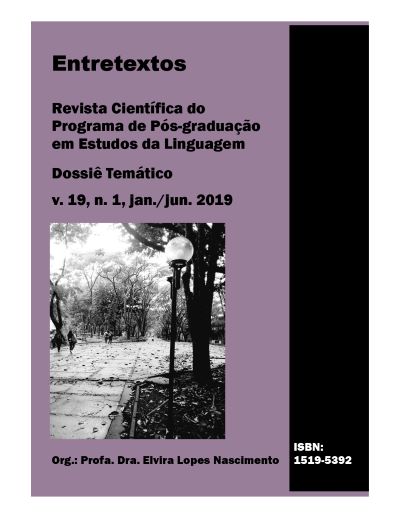The Parable as a mediating linguistic instrument in Jesus' pedagogy of the Kingdom
DOI:
https://doi.org/10.5433/1519-5392.2019v19n1p143Keywords:
Jesus, Parables, Pedagogy, ISDAbstract
The aim of this article is to promote an approximation between the pedagogy of Jesus, used in his theological work, especially in the 'Parables of the Kingdom' and Bronckart's Sociodiscursive Interactionism (ISD). From the vygotiskyano, the language-ordering of the real, and Bakhtinian presuppositions, of the textual genres as relatively stable statements, and in May of which we interact with the world, we observe that already Jesus, in his 'professional act', made use of these presuppositions, same ones that are on the bases of the ISD. The appreciation of the peculiar way in which the countrymen of Jesus saw and understood the world, as well as the use of a textual genre quite present in the Jewish religious life (the parable) to convey the news of the Kingdom, compose the scenario of production and the plot of the four parables we will analyze. The 'Parables of the Kingdom', present in the Gospel according to Mark, will be our corpus of inquiry, as well as Bronckart's 'Activity of language, text and speech'. We intend, at the end of this article, to promote a rapprochement between ISD and Biblical Studies, hitherto unknown to us, expanding not only the understanding of the pedagogical acts of Jesus, but opening space for this same action to be effective for all those who want to walk on the footsteps of Jesus and be his imitators.
Downloads
References
ASLAN, Reza. Zelota: a vida e a época de Jesus de Nazaré. 2018. São Paulo: Zahar. Disponível em: https://bit.ly/3oR3017. Acesso em: 20 jul. 2018
BAKHTIN, Mikhail. Estética da criação verbal. São Paulo: Martins Fontes, 1997.
BRONCKART, Jean-Paul. Atividade de linguagem, texto e discurso: por um interacionismo sociodiscursivo. São Paulo: Educ, 1999.
BÍBLIA. Português. Bíblia sagrada. 2. ed. São Paulo: Loyola, 2002.
COSSON, Rildo. Círculo de leitura e letramento literário. São Paulo: Contexto, 2014.
FREIRE, Paulo. A importância do ato de ler: em três artigos que se completam. São Paulo: Cortez: Autores Associados, 1992.
FREYNE, Sean. A Galiléia, Jesus e os evangelhos. São Paulo: Loyola, 1996. FREYNE, Sean. Jesus, um judeu da Galiléia: nova leitura da história de Jesus. São Paulo: Paulus. 2018. Disponível em: https://bit.ly/2O9ixg7. Acesso em: 19 jul. 2018.
GIGLIO, Auro Del. Iniciação ao Talmud. 2012. Disponível em: https://bit.ly/3aBS2av. Acesso em: 17 jul. 2018.
MACHADO, Anna Rachell; LOUSADA, Eliane; BARALDI, Glaucimara; ABREUTARDELLI, Lília Santos; TOGNATO, Maria Izabel Rodrigues. Relações entre linguagem e trabalho educacional: novas perspectivas e métodos no quadro do interacionismo sociodiscursivo. Calidoscópio, São Leopoldo, RS, v. 2, n. 2, p. 89-96, jul./dez. 2004.
ORLANDI, Eni Pulcinelli. O que é linguística. São Paulo: Brasiliense, 2005.
PIPOLLO, Miguel. A Bíblia e o trabalhador. São Paulo: Loyola, 1991.
RICOEUR, Paul. A metáfora viva. São Paulo: Loyola, 2000.
SCHNEUWLY, Bernard. Gêneros e tipos de discurso: considerações psicológicas e ontogenéticas. In: SCHNEUWLY, Bernard; DOLZ, Joaquim. Gêneros orais e escritos na escola. São Paulo: Mercado das Letras, 2004.
SCHOTTROFF, Luise. As parábolas de Jesus: uma nova hermenêutica. São Leopoldo: Sinodal, 2007.
THEISSEN, Gerd; MERZ, Annette. O Jesus histórico: um manual. 2. ed. São Paulo: Loyola, 2004.
VERMES, Geza. Jesus e o mundo do judaísmo. São Paulo: Loyola, 1996.
VYGOTSKY, Lev Semenovich. Pensamento e linguagem. [S.l]: Ed. Ridendo Castigat Mores, 2002. E-book. Disponível em: http://www.ebooksbrasil.org/adobeebook/vigo.pdf. Acesso em: 17 jul. 2018.
VYGOTSKY, Lev Semenovich; LURIA, Alexander Romanovich; Lhttps://bit.ly/3aBS2av
EONTIEV, Aléxis N. Linguagem, desenvolvimento e aprendizagem. 11. ed. São Paulo: Icone, 2010.
ZUURMOND, Rochus. Procurais o Jesus histórico? São Paulo: Loyola, 1998.
Downloads
Published
How to Cite
Issue
Section
License
Copyright (c) 2019 Entretextos

This work is licensed under a Creative Commons Attribution 4.0 International License.
Entretextos adota a Licença Creative Commons Attribution 4.0 International, portanto, os direitos autorais relativos aos artigos publicados são do/s autor/es.
Sob essa licença é possível: Compartilhar - copiar e redistribuir o material em qualquer suporte ou formato. Adaptar - remixar, transformar, e criar a partir do material, atribuindo o devido crédito e prover um link para a licença e indicar se mudanças foram feitas.























